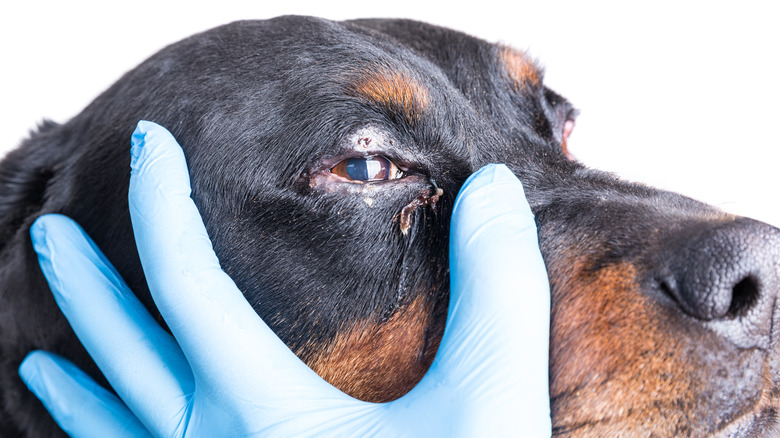Here's How To Figure Out What's Triggering Your Pet's Allergies
Just like their human companions, pets can be allergic to pollen, mold, dust mites, or certain foods. Allergies occur when the immune system reacts to a particular substance, such as grass or bee venom, explains the U.S. National Library of Medicine. Pets, however, have slightly different symptoms than their human parents.
For example, animals with food allergies may feel itchy after eating fish or wheat, but they won't necessarily experience digestive distress. What's more, some pets may become depressed or irritable after exposure to an allergen, says Animal Medical Center of Chicago.
Other common symptoms include a runny nose, compulsive paw licking, ear or skin infections, coughing, sneezing, and breathing problems. Your furry friend may also scratch his ears, chew his paws, or rub his face on the carpet.
Most pets develop allergies between ages 6 and 24 months, according to the Animal Medical Center of Chicago. Dogs tend to have multiple allergies, and some may experience seizures, secondary infections, or other complications, too. Treatment depends on what's triggering your pet's allergies and may include antifungal creams or drugs, antibiotics, corticosteroids, antihistamines, or dietary changes.
With that in mind, let's take a closer look at the most common allergens for pets.
Dust, dander, and other environmental allergens
Pollen, dust, dander, and some plants may cause seasonal allergies in pets and their human parents. Your fur baby can inhale these substances or absorb them through the skin, which may cause itching, swelling, redness, and flaking. These symptoms will only occur during the spring months or other times of the year, explains the American Kennel Club. Generally, pets with seasonal allergies develop atopic dermatitis, a condition characterized by skin inflammation.
Dogs and cats allergic to mold or house mites may experience ongoing symptoms, especially if they're constantly exposed to those substances. In this case, we're talking about inhalant allergies, according to VCA Animal Hospitals. While there's no cure, treatments can help manage your pet's symptoms and prevent flare-ups.
Your vet may prescribe anti-inflammatory drugs, therapeutic shampoos, antihistamines, or allergy shots. The latter option is used for desensitization, meaning it helps your pet's immune system get used to the allergen. This form of therapy yields positive results for more than 50% of dogs, per VCA Animal Hospitals.
Household chemicals and artificial fragrances
This may be a surprise, but your favorite perfume could make your pet sick. The same goes for household cleaners, essential oils, room fresheners, and other chemicals. Dr. Crista DeJoia, a veterinarian at Heart of the Valley Animal Shelter, warns that heavily scented products may cause allergic reactions, lethargy, and respiratory problems. Cats are particularly sensitive to perfumes and artificial scents.
Detergents and other household products pose the highest risk. "Researchers have found that through inhalation, these chemicals get into the animal's bloodstream and affect every organ the blood touches," veterinarian Gloria Dodd told Animal Wellness Magazine. "Secondly, the chemicals can get into his system through physical exchange with the person's skin or clothing."
"Inhaling is just the same as skin contact or ingestion," explained veterinarian Deva Khalsa, per Animal Wellness Magazine. Pets allergic to these chemicals may experience eye discharge, liver problems, muscle or joint pain, and digestive issues. There's also a risk of cancer and organ failure, says Khalsa.
The best thing you can do is prevent these issues in the first place. For example, you may replace household cleaners with baking soda. Essential oils can be a good substitute for room fresheners; just make sure you avoid wintergreen, pine, clove, peppermint, thyme, lavender, or tea tree essential oils. These products won't necessarily trigger allergic reactions, but they can be toxic to our furry friends, notes the Michelson Found Animals Foundation.
Certain foods and supplements
Last but not least, your pet may be allergic to certain foods and ingredients. This problem is usually due to the protein or carbs in food products, explains the University of California, Davis, School of Veterinary Medicine. Food allergies account for about 10% of all allergic reactions in dogs, causing itching, gas, diarrhea, chronic ear inflammation, and other symptoms. However, as mentioned earlier, some pets may not experience digestive problems.
Even if your pet has been eating the same food for years, he can still become allergic to it. The primary symptom is itching, according to Davies Veterinary Specialists. Most pets develop allergies to specific proteins in meat, fish, eggs, or dairy as well as the sugars in wheat and other plant-based foods. Unlike their human parents, they don't experience wheezing, chest pain, and other symptoms affecting the lower respiratory tract, notes a 2018 review published in Scientific Reports.
Note that dietary supplements may contain ingredients derived from fish, beef, soy, and other allergens. If your pet is allergic to fish, avoid giving him omega-3s, cod liver oil, and other similar products. The same goes for retail pet food, which may be subject to cross-contamination.
Your vet will likely recommend a hypoallergenic diet of hydrolyzed protein or grain-free ingredients to prevent flare-ups. Elimination diets, on the other hand, can help you identify potential allergens and food intolerances.



